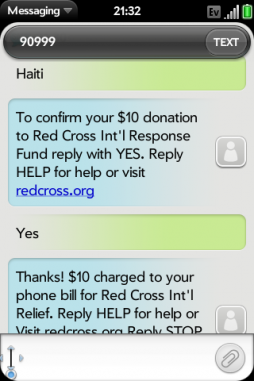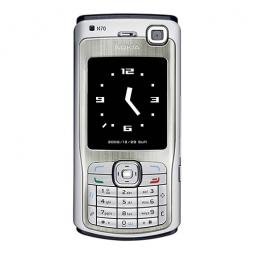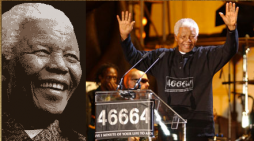mgive
Posted by AnneryanHeatwole on Jan 13, 2012
A simple text message can have a big impact. Mobile giving makes it easy to donate almost instantaneously after disaster strikes -- users authorize a mobile donation by texting a keyword to a specific short code, and the donation is then billed to the donor's mobile phone bill, eventually ending up with the nonprofit of choice.
Following the devastating Haitian earthquake of 2010 that left more than 200,000 people dead and more than 1 million Haitians homeless, mobile donations to Haiti totaled more than $43 million -- the first time mobile giving went mainstream in the United States on a large scale.
On the two-year anniversary of the Haitian earthquake, the Pew Internet Project has released "Real Time Charitable Giving," a report that delves into mobile giving and donors' motivations in the U.S.
The report, a collaboration among the Pew Internet Project, the Berkman Center for Internet and Society, the Knight Foundation, and the mGive Foundation, aims to provide a window into the motivations, benefits, and potential pitfalls of mobile giving campaigns.
Drawn from a sample of 863 individuals who made a mobile donation to the "Text for Haiti" campaign, the survey covers why the users gave, how they learned about the mobile donation campaign, how likely they were to share information about their mobile donation, and how likely they were to remain engaged with relief efforts.
| Mobile Donations and Disasters: Lessons from Haiti data sheet 634 Views |
| Countries: |
Haiti
United States
|
Posted by AnneryanHeatwole on Nov 11, 2010
The Mobile Minute is here to bring you coverage on the rise of smartphone sales around the world, a crop insurance plan in Kenya that uses mobiles to process claims and distribute money, the effect of the 2010 U.S. elections on PBS' mobile web and app usage rates, a pilot in Zambia that uses SMS to rapidly transmit HIV test results between rural clinics and hospitals, and mGive's new mobile donation options.
Posted by admin on Jan 15, 2010
In the aftermath of the devastating earthquake in Haiti, relief organizations in the United States and Europe have been able to collect substantial numbers of donations from SMS fundraising campaigns. Just like after the 2004 Tsunami in Southeast Asia, the numbers are impressive. Two charities alone, the Red Cross Foundation and Yele, collected more than $4.7 million by mid-day Thursday (less than 48 hours after the first earthquake hit). UPDATE: The Red Cross has raised close to $20 million via its SMS campaign as of January 17th.
Industry insiders had expected $2 million in text message donations for all of 2009 at the end of October. However, a natural disaster of the gravity and dimension of the earthquake in Haiti has jumpstarted the awareness of aid organizations as to the potential power of raising funds quickly via SMS.
| SMS Text Donations and the Haiti Earthquake data sheet 11610 Views |
| Countries: |
Haiti
|
Posted by KatrinVerclas on Feb 24, 2009
Mobile fundraising is taking off -- or so at least hope nonprofits hard hit by the economic downturn. Organizations are looking for a new channel for people to give on the spot, wherever they are, with their phones and a quick text message.
Mobile giving via SMS in the United States and many other parts of the world, has been out of reach because of high carrier charges - up to 50% of a donation would go to the telcom -- unacceptable to most charities.
But this has changed in the last two years. Mobile donation campaigns in the United States that go through the Mobile Giving Foundation are not subject to the high carrier fees. The Mobile Giving Foundation charges a smaller percentage fee -- currently 10%. As a result, in 2008 the field of mobile giving in the U.S. attracted the attention by organizations large and small, including by such brands as UNICEF, the Salvation Army, and the American Society for the Prevention of Cruelty to Animals.


.jpg)

